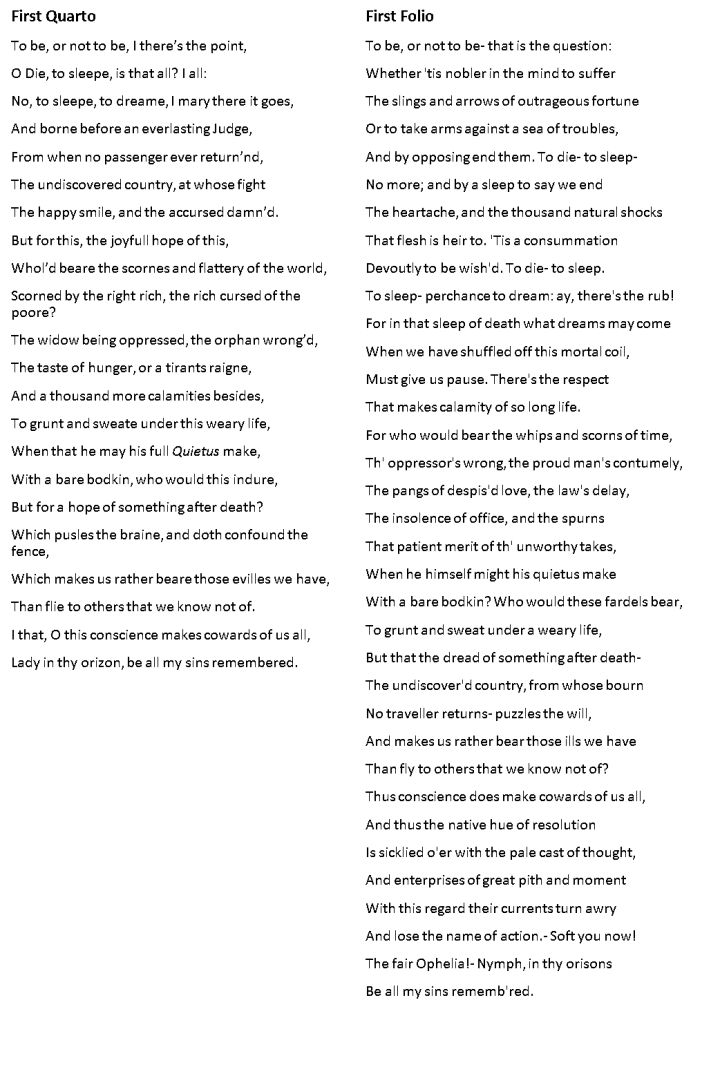The flipside to my recent piece on forgeries is missing Shakespeare plays – rather than plays we have which we know aren’t Shakespeare, these are the plays we know are Shakespeare but which we don’t have.
The act of writing down and publishing plays was not a straightforward one in Elizabethan times. The Firs Folio contains 18 plays which had been as quartos published beforehand, and 16 more which had not. There are a number of so-called “bad quartos” – early publications of plays which differ markedly from the First Folio version. The differences may be down to how they were put together – a popular theory is that they were taken down shorthand during productions or reconstructed by actors who performed in them – or down to revisions and updates as the plays were staged. The first quartos of Romeo and Juliet, Henry V, The Merry Wives of Windsor, and Hamlet are considered “bad” – the excerpts below show the scale of the differences between texts…

So not everything which was published was published well, but there’s even worse news – not everything which was published survives. Stationers produced lists of their recently published volumes (much like today’s catalogues) and Christopher Hunt’s August 1603 list includes a number of Shakespeare quartos.
marchant of vennis, taming of a shrew, …loves labor lost, loves labor won.
This isn’t the first mention of the play – that comes in Francis Meres’ Palladis Tamia* published in 1598. This lists a dozen Shakespeare plays – six tragedies and six comedies.
for Comedy, witnes his Ge[n]tleme[n] of Verona, his [Comedy of] Errors, his Loue labors lost, his Loue labours wonne, his Midsummers night dreame, & his Merchant of Venice.
Leaving aside the vagaries of Tudor spelling, this doesn’t tell us much about the content of said work. There are two theories on this. The first, based on the title and on the unusually abrupt ending of Love’s Labour’s Lost** is that it is a sequel. This would make it almost unique among Elizabethan comedies – sequels were usually reserved for history plays. The second theory is that it is an alternative title for a play which does still survive – suggestions include The Taming of the Shrew and Much Ado about Nothing. The latter suggestion has been take up by the RSC – they have a production which has just transferred to the West End which presents Love’s Labour’s Lost and Much Ado in a single billing, sharing a cast and set either side of World War One***. But we simply can’t be certain which interpretation is correct – although I will admit my money isn’t on the explanation that the Doctor used the play to trap alien witches and it originally ended with the word expelliarmus.
The other famously lost play is Cardenio which records show was performed by the King’s Men in 1613. From the title it is assumed to be based on the passage in Don Quixote (a translation of which was published in 1612, so that’s relatively speedy adapting) which tells the story of a young man, Cardenio, and his love for Luscinda. Two plays based on Cardenio do exist, and both have been claimed at various times to be Shakespeare’s play, both probably wrongly.
- The Second Maiden’s Tragedy only exists in manuscript form**** and is widely attributed to Thomas Middleton. Although one***** handwriting expert believes it is in Shakespeare’s hand the likelihood is that some of the notes and revisions are Shakespeare but not the majority of the play.
- Double Falsehood was published in 1727 by Lewis Theobald, who claimed it was Shakespeare’s Cardenio pieced together from three newly-discovered manuscripts. This was met with scepticism at the time – and indeed ever since – although recent analysis has suggested it may be the heavily-revised work of John Fletcher, Shakespeare’s collaborator. It may also be the play performed by the King’s Men in 1613, but the consensus remains that it is not Shakespeare.
So what this mostly tells us is that if it’s too good to be true, it often is! But somewhere there is still room to dream that there might be more Shakespeare plays out there waiting to be discovered…
* Subtitled “Wits Treasury”, this was a volume of early literary criticism comparing English poets and playwrights including Shakespeare, Marlowe and Chaucer to classical counterparts.
** No spoilers here! Not least because I haven’t seen it myself yet.
*** Yes of course I have tickets…
**** Without stage directions and indeed without a proper title. It was called The Second Maiden’s Tragedy thanks to comparisons with another Elizabethan play called The Maid’s Tragedy.
***** (misguided)

Westville13, you might like this link to Good Tickle Brain’s excellent comic on Cardenio…
http://goodticklebrain.com/home/2016/12/6/cardenio-in-3-panels
LikeLike
Yes I did. And in return I offer you Rudolph the Red Nosed Reindeer in Anglo Saxon; not very Billish, but certainly seasonal…
http://allthingslinguistic.com/post/135936899661/rudolph-the-red-nosed-reindeer-in-anglo-saxon
LikeLike